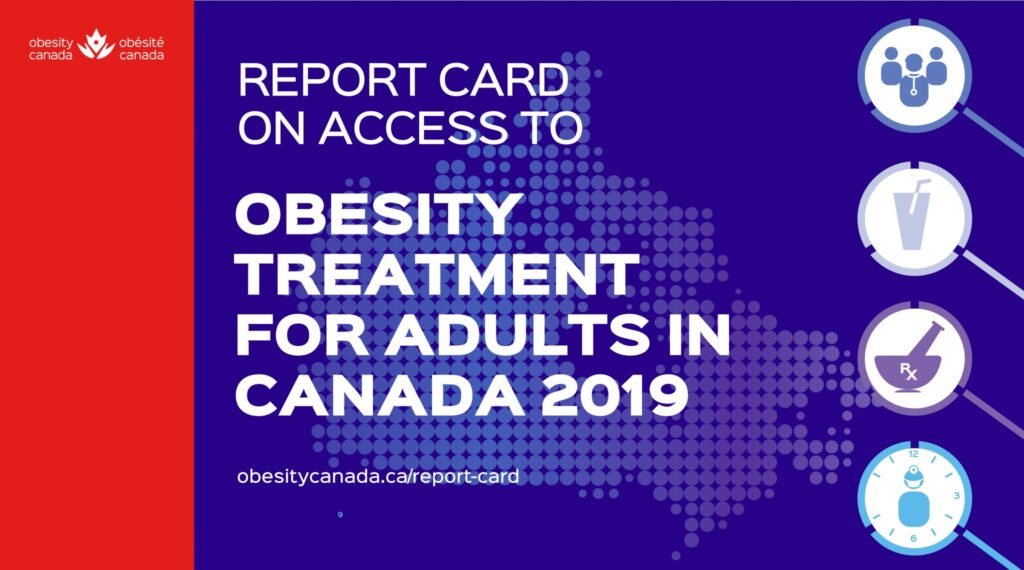
Download here:
Appendices to the Report Card on Access to Care
Download the archived 2017 Report Card on Access to Obesity Treatment for Adults in Canada
Obesity Canada’s second report card assessing access to treatment concludes Canadians living with obesity continue to be ignored by healthcare systems and health policy makers, as well as employers, compared to those requiring support for other chronic conditions
The disparity exposes the roughly six million Canadians who may be affected by this disease to negative health effects such as type 2 diabetes and hypertension, sleep apnea, reflux, depression, anxiety and more. It also puts them at risk for the effects of weight bias and discrimination at home, in the workplace, media, and at school.
“In 2017, we conducted the first rigorous, data-driven appraisal of the degree to which adults with obesity have access to the treatments that research tells us can benefit them,” says Dr. Arya. M. Sharma, scientific director for Obesity Canada. “Those results revealed treatment gaps more serious than we had anticipated – and the discouraging news is, after applying the same analysis two years later, very little has changed.”
Key findings of the Report Card on Access to Obesity Treatments for Adults in Canada 2019 include:
Less than 20% of the Canadian population with private drug benefit plans have access to the three medications indicated and approved by Health Canada for obesity treatment.
- Every province and territory receive a grade of ‘F’ for public coverage of obesity medications; the federal government receive a ‘C’.
- All provinces that offer bariatric surgery except Quebec receive an ‘F’ for overall access to surgery, as does Canada as a whole. Quebec receives a ‘D’.
- Wait times between physician referral and consultation for bariatric surgery range from 18 to 106 months and continue to hinder its utility as an obesity treatment
- The only significant improvements noted in the 2019 report are for wait times between surgical consultation and actual surgery.
- No province or territory officially recognizes obesity as a chronic disease, despite such recognition from the Canadian and American Medical Associations, the World Health Organization and other health care authorities.
- There is a profound lack of interdisciplinary teams for obesity management in Canada, despite their recognized benefits in obesity treatment guidelines.
- While the number of certified obesity medicine physicians in Canada has been rising steadily, it accounts for a very small percentage of all doctors.
- Contrasting with other chronic diseases, Canadians who may benefit from medically supervised weight-management programs with meal replacements are expected to pay out-of-pocket for meal replacement products.
“The engendered bias and discrimination are rampant in healthcare, where obesity continues to be grossly misunderstood and is not treated with the same fundamental dignity and rigor as other diseases. We deserve and demand better,” says Lisa Schaffer, obesity advocate and chair of Obesity Canada’s Public Engagement Committee. “As one of millions of Canadian living with obesity, I find it reprehensible that our healthcare systems have not made any significant improvements in access to care.”
Obesity Canada makes five key recommendations based on the 2019 report card:
- Governments, employers and the health insurance industry should officially adopt the position of the Canadian Medical Association that obesity is a chronic disease and orient their approach/resources accordingly.
- Governments should recognize that weight bias and stigma are barriers to helping people with obesity and enshrine rights in provincial/territorial human rights codes, workplace regulations, healthcare systems and education.
- Governments should include anti-obesity medications, weight-management programs with meal replacement and other evidence-based products and programs in their provincial drug benefit plans.
- Employers should recognize and respond to obesity as a chronic disease and provide coverage for evidence-based obesity programs and Health Canada approved treatments for their employees through health benefit plans.
- Governments and health authorities should increase the availability of interdisciplinary teams and increase their capacity to provide evidence-based obesity management.
“There are many barriers to more comprehensive policy approaches for obesity prevention and management in Canada, but the real culprit is a lack of understanding of obesity as a chronic disease,” said Dr. Ximena Ramos Salas, executive director of Obesity Canada. “Ultimately, the lack of policy action means that individuals with obesity are responsible for managing their disease on their own, with little support from healthcare providers, employers and policy makers. We must address this lack of understanding of obesity in order to create real change at all levels of society or this social injustice will continue to exist.”
Obesity Canada-Obésité Canada, (previously known as the Canadian Obesity Network-Réseau canadien en obésité), is Canada’s authoritative voice on evidence-based approaches for obesity prevention, treatment, and policy. Currently, the network has more than 20,000 professional members and over 25,000 public supporters. Our mission is to improve the lives of Canadians affected by obesity through the advancement of anti-discrimination, prevention, and treatment efforts.



